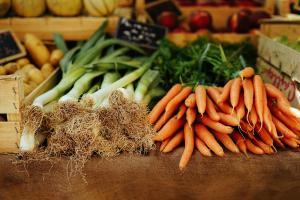Central Asia is well placed to produce fresh and dried fruit and vegetables. Countries like Kyrgyzstan, Tajikistan, and Uzbekistan are important producers of dried fruit, in particular apricots. However, traders from the region have been facing challenges with diversifying their export portfolios and tapping higher-end markets.
International standards, such as the UNECE standards for fresh fruit and vegetables and for dry and dried produce, play an important role in removing technical barriers and expanding export opportunities. This helps increase rural employment and incomes, having a direct impact on the success of several SDGs, including targets addressing poverty and nutrition.
Ensuring compliance with international standards is not always straight forward for potential exporting countries. Responding to a request by the Central Asian Working Group to Promote Exports of Agricultural Produce (CAWG), UNECE has joined hands with UNDP, OECD and Hilfswerk International to organize a practical training workshop on “Agricultural Quality standards: methods and tools for inspection and sampling of fresh and dried fruit and vegetables” in Tashkent on 4-6 June 2024.
The event brought together representatives from relevant government agencies, business associations and other stakeholders from Kazakhstan, Kyrgyzstan, Tajikistan, and Uzbekistan. The training addressed some of the core critical needs for Central Asian countries to align with international agricultural quality standards, along with helping to ensure appropriate infrastructure for inspections are in place for conformity assessment, thereby potentially opening new market opportunities and contributing to the region's sustainable development.
Chief of the UNECE Market Access Section, Mr. Ariel Ivanier, highlighted the importance of the agricultural quality standards for removing technical barriers and enhancing trade: “The UNECE standards are used by authorities to check products against a set of transparent rules, by producers to improve production and reach new markets, and by traders and retail chains to order with confidence, knowing they will get the quality of produce expected. This training is timely for Central Asia, where the potential for fresh and dried fruits production continues to grow”, he said.
The workshop covered a range of topics addressing the importance of quality standards and included practical exercises. In particular, it presented guidance and good practice experiences in the following areas:
-
Standards and inspections: Sessions detailed why quality standards matter, who they benefit, and how they are applied. Experts from Slovakia, Germany, and the United States shared insights from case studies.
-
Sampling techniques: Practical sessions on sampling fresh and dried produce provided hands-on experience.
-
Assessing product compliance with UNECE standards: Methodological guidance and practical sessions on quality assessment for apricots, apples, dried apples, walnuts, tomatoes, prunes, peaches and nectarines.
The workshop was held in continuation to a series of joint capacity building activities by UNECE, UNDP and Hilfswerk International since 2016. As stated by Mr. Ravshan Yunusov, Team Leader on Inclusive Growth at UNDP Uzbekistan: “The results of the joint UNDP/UNECE/Hilfswerk efforts have become tangible. Between 2017 and 2022 alone, the export of fresh fruit and vegetables (including nuts and dried fruit) from Uzbekistan increased by 32%, and the share of dried fruit in these exports increased from only 4%in 2005 to over 28% in 2022.”
Looking forward, Ms. Sherzoda Sitora, Head of the Exports of Industrial Products Department at the Agency for Export under the Government of the Republic of Tajikistan, stressed the commitment of Central Asian governments to continue their involvement in the development of agricultural quality standards: “CAWG will continue its activities in the region, with more focus on the development of inspection systems for export-oriented agricultural products.”
Note to editors
UNECE has developed over 100 agricultural quality standards for fresh fruit and vegetables, dry and dried produce, meat, seed potatoes, cut flowers, eggs and egg products. The standards are used internationally by governments, producers, traders, importers and exporters. The use of their common terminology and harmonized requirements helps buyers and sellers understand the quality of the products being marketed, thus reducing transaction cost and risk, while also enabling price differentiation for higher quality produce. The standards are thus an important component of a broader system of quality assurance and control supporting international trade.
UNECE standards also form the basis for agricultural quality legislation in a number of countries. For example, in the EU, trade in the 10 most traded types of fresh fruit and vegetables (apples, citrus fruit, kiwi, lettuce, peaches and nectarines, pears, strawberries, sweet peppers, table grapes and tomatoes) have to comply with specific marketing standards of the EU, which are harmonized with UNECE standards.


